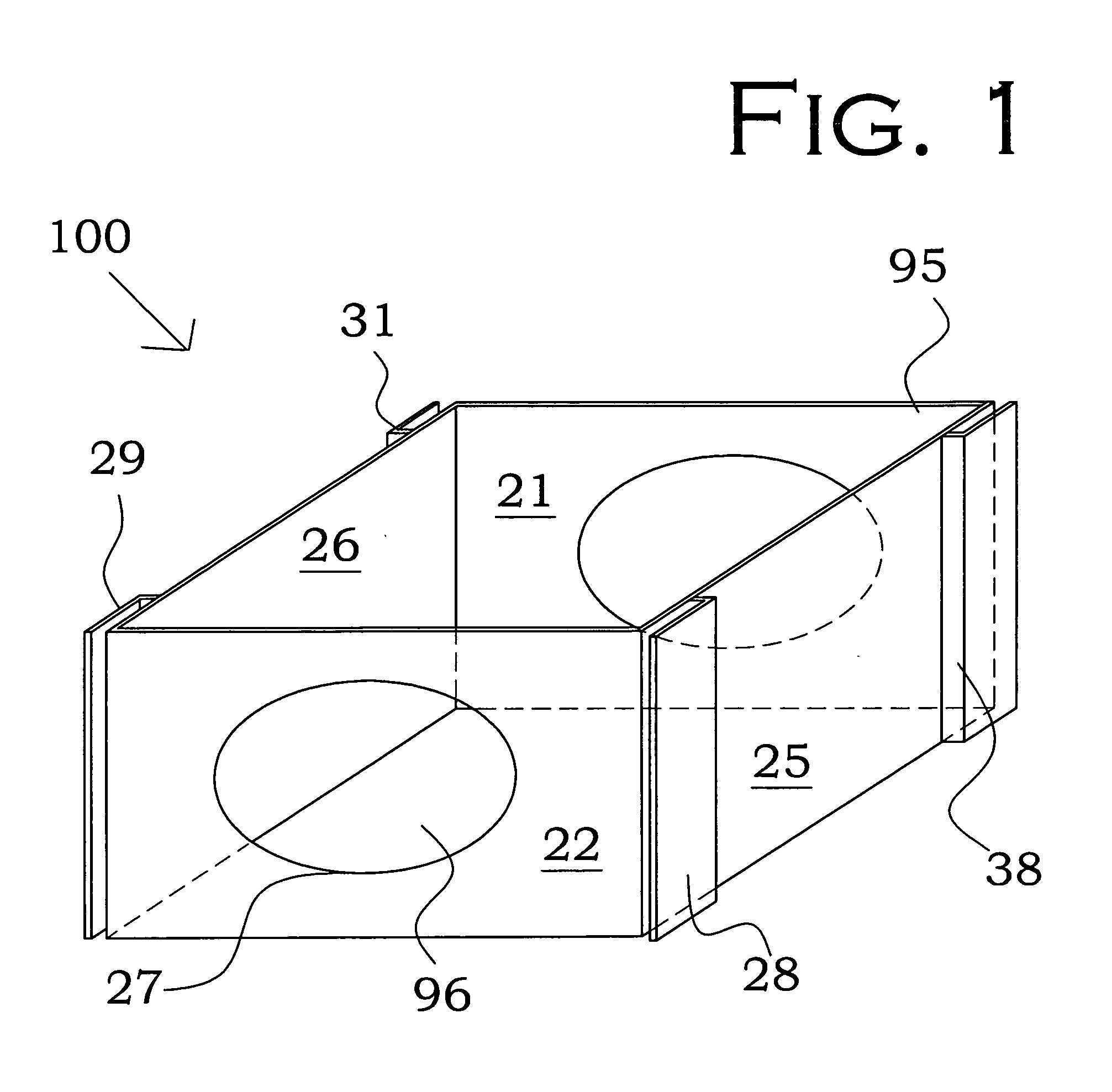Flood levee and barrier module and system
a technology applied in the field can solve the problems of deficient solutions in some areas, economic losses, and inability to meet the needs of people, and achieve the effect of barriers, and reducing the number of levees
- Summary
- Abstract
- Description
- Claims
- Application Information
AI Technical Summary
Benefits of technology
Problems solved by technology
Method used
Image
Examples
second embodiment
[0069] Referring now to FIG. 6, FIG. 7, and FIG. 8, a levee and barrier module, shown generally as reference number 200, is illustrated in accordance with the second exemplary embodiment of the present invention. The levee and barrier module 200 of the second embodiment comprises the outer shell formed of side walls 25, 26 and end walls 21, 22, with a second module-to-module connecting system used to connect horizontally and vertically adjacent levee and barrier modules 200. Module 200 is useful for construction of a levee or barrier system either above or below the level of the water.
[0070] This second connecting system includes a substantially vertical lateral projection 43, a substantially vertical lateral projection 44, a substantially vertical lower projection 45, and a substantially vertical lower projection 42. Lower projection 45 is a panel somewhat shorter in length than side wall 25 and can be attached to—or integrally formed with—the lower edge of side wall 25, extending ...
third embodiment
[0093] The top view of FIG. 11 illustrates not only the third module-to-module connection type, but also the additional feature of top end guide plates 40, 81 with conduits 90, 93 plus top side guide plates 83, 89 added to the basic module of FIG. 10. The opposing bottom guide plates, not shown, are also provided.
[0094]FIG. 11 additionally illustrates the additional optional feature of a cornering module-to-module connection system. In constructing a levee, at times there is a need to construct a substantially 90-degree corner. Additional complementary flanges 334 and 333 can be installed on the side walls 25 or 26. Complementary flanges 334 and 333 can interconnect with flanges on a 90 degree offset module 300″, to provide for a 90-degree angle corner.
[0095] Referring now to FIG. 12 and FIG. 13, a levee and barrier module, shown generally as reference number 400, is illustrated in accordance with the fourth embodiment of the present invention. The fourth embodiment provides a coll...
fourth embodiment
[0098] An additional system of application of the collapsible module of the fourth embodiment is the utilization of side partition 410 and side partition 415 to extend the levee and barrier module system over a pipeline. Partition 410 and side partition 415 can be configured to be somewhat reduced in height (not shown) to allow space for the pipeline to run under them. The reduction in height would be to a dimension determined by the pipeline structure that side partition 410 and side partition 415 will be passing over. Because side partition 410, and side partition 415 are smaller and lighter and move freely up and down, they would provide structure to the levee and barrier module system, but would not deform or damage the pipeline positioned under them. Additional support could be provided below the pipeline, as desired. Optionally, side partition 410 and side partition 415 can extend between two full size modules (such as the full size module illustrated in FIG. 11) instead of ex...
PUM
 Login to View More
Login to View More Abstract
Description
Claims
Application Information
 Login to View More
Login to View More - R&D
- Intellectual Property
- Life Sciences
- Materials
- Tech Scout
- Unparalleled Data Quality
- Higher Quality Content
- 60% Fewer Hallucinations
Browse by: Latest US Patents, China's latest patents, Technical Efficacy Thesaurus, Application Domain, Technology Topic, Popular Technical Reports.
© 2025 PatSnap. All rights reserved.Legal|Privacy policy|Modern Slavery Act Transparency Statement|Sitemap|About US| Contact US: help@patsnap.com



